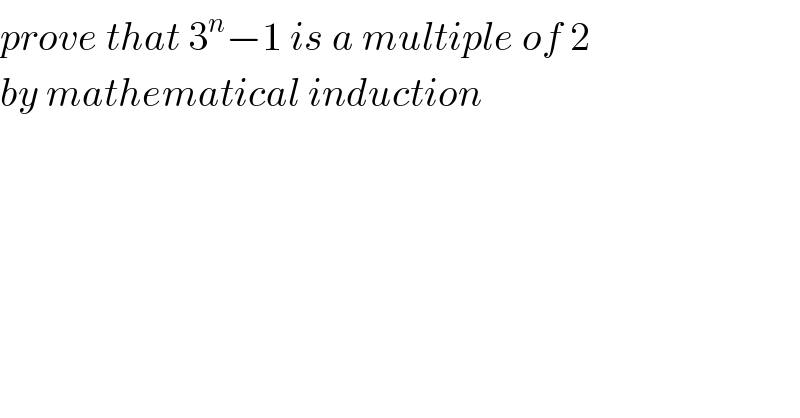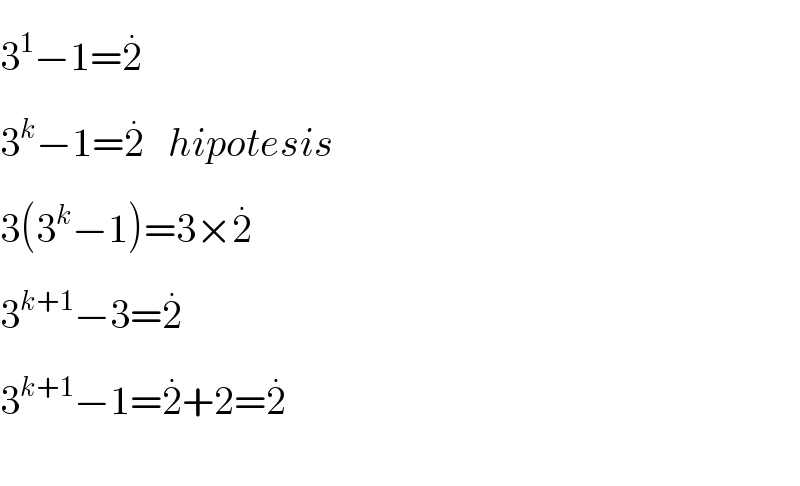
Question Number 24822 by NECx last updated on 26/Nov/17

$${prove}\:{that}\:\mathrm{3}^{{n}} −\mathrm{1}\:{is}\:{a}\:{multiple}\:{of}\:\mathrm{2} \\ $$$${by}\:{mathematical}\:{induction} \\ $$
Commented by maxmathsup by imad last updated on 24/May/19

$${n}=\mathrm{0}\:\rightarrow\mathrm{3}^{\mathrm{0}} −\mathrm{1}\:=\mathrm{0}\:\:{multiple}\:{of}\:\mathrm{2}\:\:\:{let}\:{suppose}\:\mathrm{3}^{{n}} −\mathrm{1}\:{multiple}\:{of}\:\mathrm{2}\:\Rightarrow \\ $$$$\mathrm{3}^{{n}} −\mathrm{1}\:=\mathrm{2}{k}\:\:\:\:\Rightarrow\mathrm{3}^{{n}+\mathrm{1}} −\mathrm{1}\:=\mathrm{3}^{{n}} \:.\mathrm{3}\:=\left(\mathrm{2}{k}+\mathrm{1}\right)\mathrm{3}\:−\mathrm{1}\:=\mathrm{6}{k}\:+\mathrm{3}−\mathrm{1}\:=\mathrm{6}{k}+\mathrm{2} \\ $$$$\mathrm{2}\left(\mathrm{3}{k}+\mathrm{1}\right)\:=\mathrm{2}{k}^{'} \:\:\:\:\:\:\:{with}\:{k}^{'} \:=\mathrm{3}{k}+\mathrm{1}\:\:{so}\:{the}\:{relation}\:{is}\:{true}\:{at}\:{term}\:{n}+\mathrm{1}. \\ $$
Answered by jota+ last updated on 27/Nov/17

$$\mathrm{3}^{\mathrm{1}} −\mathrm{1}=\overset{.} {\mathrm{2}} \\ $$$$\mathrm{3}^{{k}} −\mathrm{1}=\overset{.} {\mathrm{2}}\:\:\:{hipotesis} \\ $$$$\mathrm{3}\left(\mathrm{3}^{{k}} −\mathrm{1}\right)=\mathrm{3}×\overset{.} {\mathrm{2}}\:\:\: \\ $$$$\mathrm{3}^{{k}+\mathrm{1}} −\mathrm{3}=\overset{.} {\mathrm{2}} \\ $$$$\mathrm{3}^{{k}+\mathrm{1}} −\mathrm{1}=\overset{.} {\mathrm{2}}+\mathrm{2}=\overset{.} {\mathrm{2}} \\ $$$$ \\ $$
Commented by Rasheed.Sindhi last updated on 27/Nov/17

$$\mathrm{Also}\:\mathrm{like}\:\mathrm{your}\:\mathrm{notation}\:\left(\overset{.} {\mathrm{2}}\right) \\ $$$$\mathrm{for}\:'\mathrm{multiple}\:\mathrm{of}\:\mathrm{2}' \\ $$
Commented by math solver last updated on 27/Nov/17

$$\mathrm{i}\:\mathrm{guess}\:\mathrm{this}\:\mathrm{is}\:\mathrm{usual}\:\mathrm{notation}\:\mathrm{in}\:\mathrm{spain}. \\ $$
Commented by Rasheed.Sindhi last updated on 27/Nov/17

$$\mathrm{But}\:\mathrm{I}\:\mathrm{see}\:\mathrm{it}\:\mathrm{for}\:\mathrm{first}\:\mathrm{time}! \\ $$$$\mathrm{Reason}\:\mathrm{may}\:\mathrm{be}\:\mathrm{that}\:\mathrm{I}\:\mathrm{haven}'\mathrm{t} \\ $$$$\mathrm{read}\:\mathrm{so}\:\mathrm{many}\:\mathrm{math}\:\mathrm{books}. \\ $$
